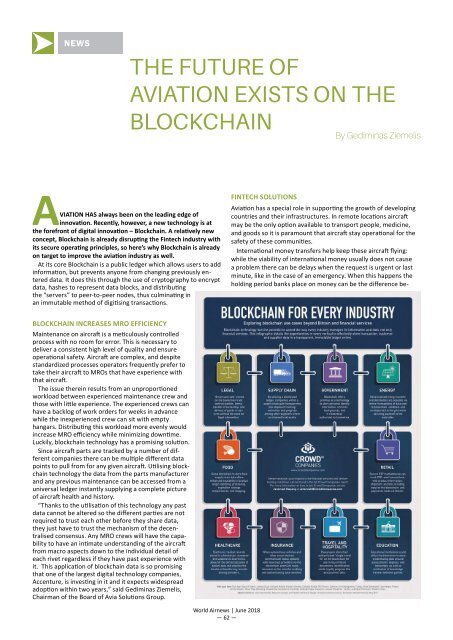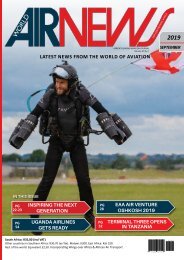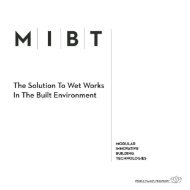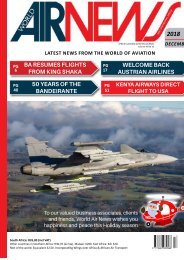World AirNews June 2018
- No tags were found...
You also want an ePaper? Increase the reach of your titles
YUMPU automatically turns print PDFs into web optimized ePapers that Google loves.
NEWS<br />
THE FUTURE OF<br />
AVIATION EXISTS ON THE<br />
BLOCKCHAIN<br />
By Gediminas Ziemelis<br />
NEWS<br />
A<br />
VIATION HAS always been on the leading edge of<br />
innovation. Recently, however, a new technology is at<br />
the forefront of digital innovation – Blockchain. A relatively new<br />
concept, Blockchain is already disrupting the Fintech industry with<br />
its secure operating principles, so here’s why Blockchain is already<br />
on target to improve the aviation industry as well.<br />
At its core Blockchain is a public ledger which allows users to add<br />
information, but prevents anyone from changing previously entered<br />
data. It does this through the use of cryptography to encrypt<br />
data, hashes to represent data blocks, and distributing<br />
the “servers” to peer-to-peer nodes, thus culminating in<br />
an immutable method of digitising transactions.<br />
FINTECH SOLUTIONS<br />
Aviation has a special role in supporting the growth of developing<br />
countries and their infrastructures. In remote locations aircraft<br />
may be the only option available to transport people, medicine,<br />
and goods so it is paramount that aircraft stay operational for the<br />
safety of these communities.<br />
International money transfers help keep these aircraft flying:<br />
while the viability of international money usually does not cause<br />
a problem there can be delays when the request is urgent or last<br />
minute, like in the case of an emergency. When this happens the<br />
holding period banks place on money can be the difference be-<br />
BLOCKCHAIN INCREASES MRO EFFICIENCY<br />
Maintenance on aircraft is a meticulously controlled<br />
process with no room for error. This is necessary to<br />
deliver a consistent high level of quality and ensure<br />
operational safety. Aircraft are complex, and despite<br />
standardized processes operators frequently prefer to<br />
take their aircraft to MROs that have experience with<br />
that aircraft.<br />
The issue therein results from an unproportioned<br />
workload between experienced maintenance crew and<br />
those with little experience. The experienced crews can<br />
have a backlog of work orders for weeks in advance<br />
while the inexperienced crew can sit with empty<br />
hangars. Distributing this workload more evenly would<br />
increase MRO efficiency while minimizing downtime.<br />
Luckily, blockchain technology has a promising solution.<br />
Since aircraft parts are tracked by a number of different<br />
companies there can be multiple different data<br />
points to pull from for any given aircraft. Utilising blockchain<br />
technology the data from the parts manufacturer<br />
and any previous maintenance can be accessed from a<br />
universal ledger instantly supplying a complete picture<br />
of aircraft health and history.<br />
“Thanks to the utilisation of this technology any past<br />
data cannot be altered so the different parties are not<br />
required to trust each other before they share data,<br />
they just have to trust the mechanism of the decentralised<br />
consensus. Any MRO crews will have the capability<br />
to have an intimate understanding of the aircraft<br />
from macro aspects down to the individual detail of<br />
each rivet regardless if they have past experience with<br />
it. This application of blockchain data is so promising<br />
that one of the largest digital technology companies,<br />
Accenture, is investing in it and it expects widespread<br />
adoption within two years,” said Gediminas Ziemelis,<br />
Chairman of the Board of Avia Solutions Group.<br />
tween life and death.<br />
“Using blockchain for micro-remittance transfers allows for<br />
transactions to be made without the holding times that exist with<br />
centralised financial institutions.<br />
“This is possible because blockchain technologies reduce the<br />
need for intermediaries by securely going to peer-to-peer transfers.<br />
Applications are in development that fixes the value of digital<br />
cash in real time permitting the user to hold this digital cash and<br />
transfer it when necessary while also minimizing processing fees,”<br />
explains G. Ziemelis.<br />
REDUCE PASSENGER HEADACHES<br />
There is good news in the travel industry; according to SITA. 2016<br />
saw the lowest number of passenger bags lost or mishandled at 5,<br />
73 bags per thousand passengers. The bad news is this still equates<br />
to over 650,000 bags.<br />
Recent reform such as the International Air Transport Association<br />
Resolution 753 is making strides to significantly reduce this number<br />
with the integration of IoT, and with the advent of blockchain there<br />
exists real opportunity to bring mishandled bags down to near zero<br />
by tracking them from gate to gate.<br />
Using blockchain data is a dynamic solution as it enables a secure<br />
way for luggage to be logged at each checkpoint on its journey<br />
ensuring its complete travel history is available regardless of what<br />
airport or country it arrives in.<br />
BLOCKCHAIN TO REDUCE PART FRAUD<br />
From the time an aircraft part is created to the end of its serviceable<br />
life, all appropriate information regarding its use will have<br />
been logged. While normally a trusted and standardised process,<br />
there have been cases of parts fraud in the aviation industry<br />
putting countless lives at risk.<br />
A couple years back a part broker was caught misrepresenting<br />
the condition and origin of the aircraft parts he was distributing<br />
out of Miami, Fl.<br />
Through an investigation from the FBI it was uncovered the parts<br />
supplier used unauthorized dealers to manufacture the parts and<br />
concealed the process by creating a Certificate of Conformance<br />
with a forged OEM logo.<br />
While part brokers are often a secure and economical option to<br />
fulfil a need, cases like what happened in Miami indicate they can<br />
carry a higher risk, especially for life-limited parts. Using a part’s<br />
serial numbers and RFID tracking, combined with the blockchain<br />
will provide a modernised and immutable method for aircraft<br />
manufacturers, and their buyers, to confidently track the condition<br />
of their parts.<br />
“Since every transaction on the blockchain is verified by multiple<br />
nodes, the parts broker will benefit as well. The distributed ledger<br />
allows for smart contracts that can quickly change the ownership<br />
of physical assets through digital means effectively increasing the<br />
speed and efficiency of the parts supply chain,” says the international<br />
businessman.<br />
LOOKING TO THE FUTURE<br />
Although blockchain used to be synonymous with crypto currency,<br />
the paradigm surrounding its use has already changed. The future<br />
of blockchain is still unclear, but what is clear is that it is set to<br />
improve the aviation industry as a whole. And those who are the<br />
early adopters will have the greatest opportunity to influence the<br />
changes it will bring.<br />
“At Avia Solutions Group we make it our responsibility to stay on<br />
the leading edge of aviation by welcoming and implementing new<br />
ways of thinking about technology, because we recognize that the<br />
future is always closer than you think,” said Gediminas Ziemelis. Q<br />
<strong>World</strong> Airnews | <strong>June</strong> <strong>2018</strong><br />
— 62 —<br />
<strong>World</strong> Airnews | <strong>June</strong> <strong>2018</strong><br />
— 63 —





